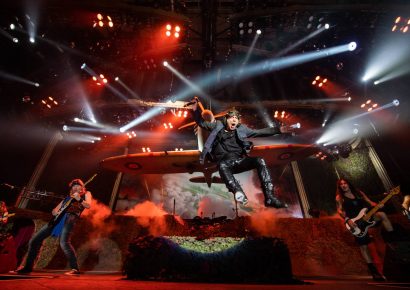"He’d look at me and then all of a sudden, 'Fill!'"
It’s been five years since the music world was rocked by the news that Prince had passed away. But while Prince is gone, his music is more accessible than ever. Multiple Prince albums have received the deluxe reissue treatment since his passing, along with a number of vintage live recordings.
But 2021 brings us something unforeseen – a brand new Prince album, the contents of which have largely eluded bootleggers and superfans. Recorded in Prince’s Paisley Park home recording studio with the assistance of a crack crew of musicians, Welcome 2 America arrives more than ten years after its creation.
Read up on all the latest interviews, features and columns here.
The core of the record was tracked by the trio of Prince, bass player Tal Wilkenfeld and drummer Chris Coleman. Prince then brought in New Power Generation vocalists Liv Warfield, Shelby J. and Elisa Fiorillo to accentuate the album’s politically-charged narrative before sending it off to the NPG’s Morris Hayes for keyboards and additional production.
Bass player Wilkenfeld first connected with Prince at a party in his Los Angeles home a couple of years before recording Welcome 2 America. Then, after Prince saw a video of Wilkenfeld performing live with Jeff Beck, he proposed they form a trio and entrusted her to find a drummer. Wilkenfeld brought in her good friend Chris Coleman and together they travelled to Paisley Park to get to work on what would become Welcome 2 America.
The finished product is a fully realised 12-song album with a sharp socio-political conscience. Including lines like, “Land of the free, home of the slave,” the title track sounds like a direct takedown of the Pro-Trump movement that was prevalent over the last four years. Like much of the album, it’s a salient reminder that Trumpism didn’t arise in a vacuum and that for all his cosmic funk eccentricities, Prince was one of the great social commentators of his era.
Mixdown spoke to Wilkenfeld about working with Prince, the slapdash nature of the recording sessions, and what she took away from the whole experience.
When you left Paisley Park in 2010, can you remember how you were feeling about the music you’d recorded? Were you eager for people to hear it?
Tal Wilkenfeld: I never have expectations when I do a recording session. It’s my way of curbing my enthusiasm so that I don’t feel disappointed. But it did seem like Prince was getting really excited about the project because after we had all worked on it, he flew us back just to listen to the finished project; twice – two listening parties of the completed album.
What sort of knowledge did you have about Prince before working with him? Would you have called yourself a fan?
I was a fan, but I was becoming a fan by interacting with him in real time. I kind of purposely liked to do that with artists I worked with. I don’t want to go and listen to every piece of their catalogue, because it can sometimes cloud my ability to think outside the box if I get too much of an idea of what they like and don’t like.
You suggested Chris Coleman as the drummer. What made you think he’d fit the role?
I already knew what a sweet, supportive guy he was and to have a trio, it’s all about having empathic communicators. There’s so much space and you could easily fill it up with garbage, so you need to find musicians that know how to tolerate the space, when to fill it up, when to leave it sparse, and how to manoeuvre.
When the three of you were working together, did Prince spend much time discussing his vision for Welcome 2 America?
Not at all. There was no rehearsal, there was no even showing us the songs – it was like, “Hey, we’re going to go this chord to this chord to this chord and then we’ll hit the chorus and then back to the verse and then I don’t know how long the bridge is going to go, but we’ll figure it out.” He didn’t sing along – nothing. And we’d do one, maybe two takes and that’s how the whole album was made.
Does that way of working suit you?
I love that way of working, but I’ve never done it with musicians that aren’t somewhat orientated around jazz music. Like, when I play with Herbie Hancock and Chick Corea, it’s to be expected, but I didn’t expect that walking into a Prince recording.
So it suited me great and he loved having people on the edge of their seats, not knowing what was happening. I think you can’t help but get a genuine, authentic response from someone when you’re like, “OK, now! No second chance.”
When you heard the finished album those first couple of times, how did you react to your own contributions?
I remember being pleasantly surprised with how musical everything had worked out and that’s always my ultimate goal. Like, if I’m doing the best thing to support the song then I am deeply satisfied. I was surprised at how well the drums and bass were supporting the song given the fact that we weren’t hearing the song.
Were you surprised by the extent of political and social commentary contained on the album?
It wasn’t a surprise because we’d spent so many meals discussing spirituality and the music business and politics. That’s all he wanted to talk about, one of those three things, or music. So it wasn’t a surprise at all.
What’s the main thing that stands out when you reflect on your time with Prince?
The fact that he trusted me as much as he did. He never told me what to play; he just trusted me to play whatever was in my head and giggled about it. Like on ‘Same Page, Different Book’, I had no idea that there was going to be all those bass fills. He’d look at me and then all of a sudden, “Fill!” And then I’d do it, and it would happen again, and a third time, and by the fourth time I was laughing so hard that you’ll notice that there’s no fill on that time round.
But, yeah, it was just funny how much he was into Chris and I being our authentic selves.
Prince’s posthumous record Welcome 2 America is out now through NPG Records.

